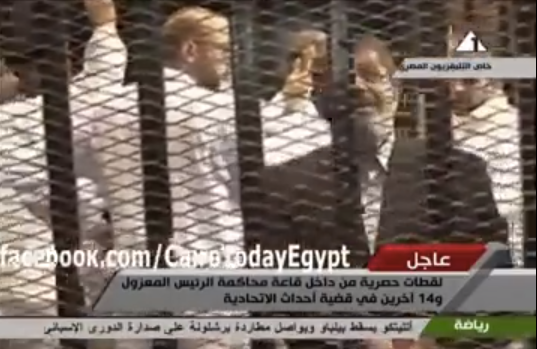Chaos reigned in court on the first day of the trial of ex-Egyptian president Mohamed Morsi, yet cross-city protests remained unusually calm.
The trial was adjourned until 8 January after the 15 defendants disrupted proceedings with chanting and Morsi stood up four times to speak.
Morsi, 62, in his first public outing in four months after being ousted and detained on 3 July, rejected the court’s legitimacy and demanded the “coup leaders” be prosecuted.
“I am Dr Mohamed Morsi and I am president of the Republic,” he insisted from the defendant cage in the courtroom.
“I am here by force and against my will … This court, with all due respect, doesn't have jurisdiction over the president. There is a military coup in this country. The leaders of this coup must be brought to trial according to the constitution."

The watching media were just as unruly. Guardian journalist Patrick Kingsley reported that defence lawyers started shouting "the people demand the return of the president" and some Egyptian journalists responded with calls of “Execution!”. A fight broke out between rival lawyers and one tried to throw a shoe.
Morsi arrived in the courtroom just after 10am wearing a dark blue suit and white shirt. He was greeted by his 14 Muslim Brotherhood co-defendants, including former deputy chairman of the movement’s political arm, Essam el Erian, and prominent identity Mohamed el Beltagy, with the four-fingered "Rabaa" sign and applause.
The hearing was suspended twice as Judge Ahmed Sabry Youssef fought to control the rowdy courtroom, while state TV reported that proceedings did not start until Morsi changed into the white uniform compulsory for accused criminals.
The defendants are charged with incitement to violence and murder of 11 people , who were killed outside the presidential palace in December 2012. A guilty verdict could result in the death penalty or life imprisonment.
Morsi was taken to the Borg al-Arab prison in Alexandria after the hearing, instead of the secret location where he’s been held since July.
The trial was held at the Police Academy on the eastern outskirts of Cairo instead of the expected Police Institute close to Tora Prison. Judicial sources told AP this was to prevent large numbers of people converging on the site.
The last-minute news on Sunday of the sudden location change caused initial comparisons to be made with the trial of Hosni Mubarak — who was tried in the same location on the same charges — and online wags quickly spread the joke that Egyptian presidents serve two terms: one in office and the other in prison.
Heavy security measures were a stark reminder of the military crackdown in place since August. In Cairo 20,000 police were deployed to shut down violent protests and the squares of Tahrir, Rabaa al-Adeweya and Nahda were closed to vehicle and foot traffic all day.
Phones and cameras were banned from the courtroom, and the select few western journalists given permits for the trial were stringently searched.
Pittsburgh Tribune-Review correspondent Betsy Hiel said her boots and hair were searched, and the Telegraph’s Richard Spencer tweeted later that his biro was checked for “hidden cameras”.
Only four of the defendants’ 28 lawyers were allowed into the court. Outside, lawyers Mohamed Ali and Ayman Awn claimed permits for them to enter had been deliberately blocked.
Amnesty International said defence lawyers had only been given access to the 7000 pages of court documents on Thursday, and made to pay US$2177 for the privilege.
“This does not bode well for the fairness of this trial,” said Hassiba Hadj Sahraoui, Amnesty’s deputy director for the Middle East and North Africa, before the trial.
“The delay in handing over the case file leaves the lawyers with insufficient time to prepare their defence, in breach of Egypt’s human rights obligations.”
About 300 Morsi supporters gathered outside the Police Academy and shouted slogans against army chief Gen Abdel Fattah al-Sisi, chased off a state television reporter and assaulted two other journalists.
Across Cairo, outside the downtown High Court police fired tear gas at a pro-Sisi and pro-Morsi standoff.
Further south in Maadi, soldiers looked on tolerantly as several thousand Morsi supporters gathered before marching north, spray-painting new anti-Sisi invectives on the front of an armoured personnel carrier and on the side of the at the Supreme Constitutional Court house.
Essam Mahmoud, 38, told New Matilda he’d travelled from Luxor two days earlier to take part in the Nile-side protest in Maadi.
Unlike other protesters in the march who were adamant Morsi would soon return to the presidency, Mahmoud was just disillusioned with the governing authorities.
“Everyone is tired,” he said. “It’s all talking, talking, talking [about jobs and the economy]. And for what?”
He said people in Upper Egypt were suffering without tourists. There were no jobs and therefore no money.
Brookings Institute fellow Dr H.A. Hellyer commented on Twitter that the tone of recent protests could damage the Muslim Brotherhood cause. The group has been trying to associate itself with the "anti-coup" label instead of Morsi to attract wider support.
“In the last few weeks, it's become increasingly difficult for the 'pro-Morsi' camp to deny that label as appropriate. It just became harder,” he said.
Amnesty’s Hadj Sahraoui also said the trial was a test for the Egyptian authorities, who are keen to return domestic and international focus to the Brotherhood’s bad record in office, and away from the massacres over the summer in which thousands of people died.
“They should … grant him [Morsi] a fair trial, including the right to challenge the evidence against him in court. Failing to do so would further call into question the motives behind his trial,” he said.
Donate To New Matilda
New Matilda is a small, independent media outlet. We survive through reader contributions, and never losing a lawsuit. If you got something from this article, giving something back helps us to continue speaking truth to power. Every little bit counts.



